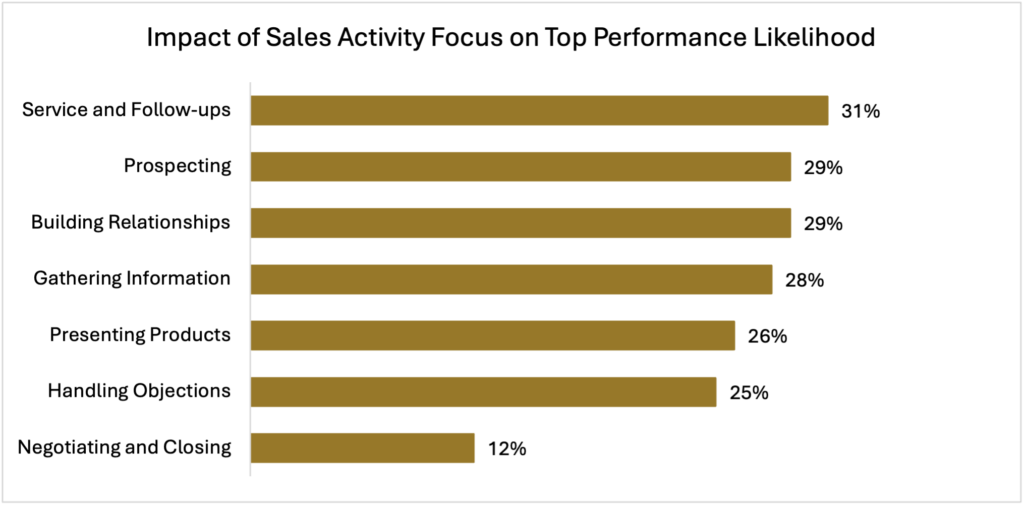Ask most sales managers what they want from their team, and they’ll often emphasize results. So, it’s no surprise that “closing” frequently becomes the part of the sales process salespeople focus on most.
But what if that emphasis is hurting performance instead of helping it?
That’s one of the insights found in a recent study from Purdue University’s Center for Food and Agricultural Business. From October 2023 to April 2024, we surveyed a total of 2,200 agribusiness sales professionals as part of the Sales Excellence Survey, collecting data on their routines, use of sales tools, and how they prioritize different steps in the sales process.
One finding that stood out was the importance many salespeople placed on closing deals. And notably, those salespeople who ranked closing as the most important part of the process were less likely to exceed their sales goals.
What salespeople value and how it impacts performance
Survey respondents were asked to rank seven core sales activities according to how important they believed each one was to their success as salespeople:
- Prospecting and finding new opportunities
- Building trust and relationships
- Gathering information to understand your prospects or customers
- Presenting Products
- Handling objections
- Negotiating and closing
- Service and follow-ups
We then analyzed how these rankings correlated with performance – specifically, how often a salesperson exceeded their sales goals versus meeting them, struggling or viewing their goals as unrealistic.
Here’s what we found:
Salespeople who placed the most importance on closing actually had the lowest performance.
The graph below shows how likely a salesperson is to be a top performer – defined as someone who consistently exceeds their goals – based on how they ranked each step in the sales process.

Why overemphasizing the close can hurt
This may seem counterintuitive at first. After all, closing is essential. But the data suggests that when salespeople fixate on closing, they may rush or shortcut earlier steps in the process, like qualifying prospects, understanding customer needs and building trust.
This rushed approach can lead to poorly aligned solutions, weaker relationships and missed opportunities. All of which make closing more difficult, not easier.
Instead, top-performing salespeople tend to focus on earlier steps, such as gathering information and building relationships. They take time to understand their customers, which leads to more confident recommendations and more successful outcomes.
What this means for agribusiness sales managers
In agribusiness, where relationships, risk and long-term value often outweigh quick wins, this finding matters.
Yes, salespeople need to keep their sales goals in mind, but more importantly, they need to understand the entire process of a successful sale, from selecting their prospects to follow-up services.
As a sales leader, this research reinforces the importance of:
- Coaching your team to treat the entire sales process as critical – not just the close
- Helping reps develop skills around prospecting, listening and trust-building
- Reinforcing the idea that closing is a result of doing everything else well
Overemphasizing the close may unintentionally weaken the very process that gets them there. The entire process matters and sales managers play a key role in shaping how reps approach it.




